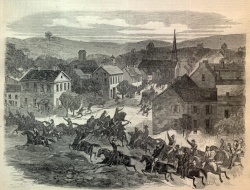Portal:Federalism and Democracy
Federalism and Democracy
|
America became a federal republic in 1787 when the Constitution was ratified. "Republic", as we use the word, is "a government in which supreme power resides in a body of citizens entitled to vote and is exercised by elected officers and representatives responsible to them and governing according to law."[1]. It can be more succinctly called a Representative Democracy. In our context, Federalism is "the principle of a federal union between the American colonies after the Revolution and of the formation and adoption of a constitution."[1] And, in case you wonder, "federal" is "of or relating to a state formed by the consolidation of several states which retain limited residuary powers of government under the common sovereignty of the new state."[1] There are other definitions of these terms, but these are the definitions that best apply to CW's discussion of the United States of America. So, The United States of America is a constitutional, federal republic governed by officials that are democratically elected. America was not the first constitutional republic, but it was quite new in important ways. The Americans of the time drew on examples that came before it and on a variety of liberal thought that had existed in Europe (going back to Aristotle) and in America. It drew heavily on the English examples of constitutional monarchy, the English Constitution, and Common Law (started by Henry II, King of England 1154 - 1189). America was in a unique position - having an unusual collection of very agile intellects (Adams, Franklin, Hamilton, Jay, Madison, Otis, Paine, Washington and others), a history of previous examples to inform them, the recent history of events in America and England, and a blank (well, almost blank) page to write on. Perfection can't be achieved in such a complex endeavor involving so many interests, but it was the most perfect such union ever created - by whatever measure you wish to pick. This portal is the place to assign articles discussing the transition from independence to having a ratified constitution. It is also the place to discuss attributes of our constitutional republic. Therefore, articles about our Constitution belong here. Articles about the very important concept of 'rule of law' belong here. There may seem to be overlap between this and other categories, such as American Independence. We currently intend that: Articles about the time period from 1763, when England turned its attention to America in unwelcome ways, and through the winning of independence, belong in the topics and subtopics of American Independence. Articles about the transition from the Articles of Confederation to a ratified Constitution of the United States should be assigned to this topic and subtopics. For example: articles about such items as the Federalist Papers (and Anti-Federalist Papers) belong here. What makes the subject of this portal worth writing about is that America has been so successful for so long - due mostly to the work of those who wrote and ratified our Constitution. In today's environment of deep political divisions, it may help to remind ourselves of our beginnings and the problems and issues that our founders struggled with. They were not entirely different than the problems and issues we deal with today.
|
 Morgan's Raiders entering Washington, Ohio in August, 1863 |
CategoriesClick on arrows to see subcategories and articles. no pages or subcategories Things you can doHere are some things you can do:
|
TBD
Articles |